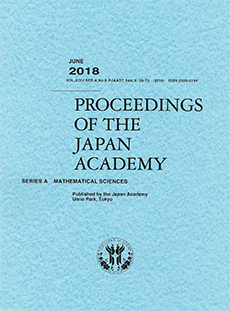Abstract
Let $a$, $b$, $c$ be fixed coprime positive integers. In this paper we prove that if $b \equiv 3 \pmod{4}$, $a \equiv -1 \pmod{b^{2l}}$, $a^2 + b^{2l-1} = c$ and $c$ is odd, where $l$ is a positive integer, then the equation $a^x + b^y = c^z$ has only the positive integer solution $(x,y,z) = (2,2l-1,1)$.
Citation
Maohua Le. "A note on the exponential diophantine equation $a^x + b^y = c^z$." Proc. Japan Acad. Ser. A Math. Sci. 80 (4) 21 - 23, April 2004. https://doi.org/10.3792/pjaa.80.21
Information





